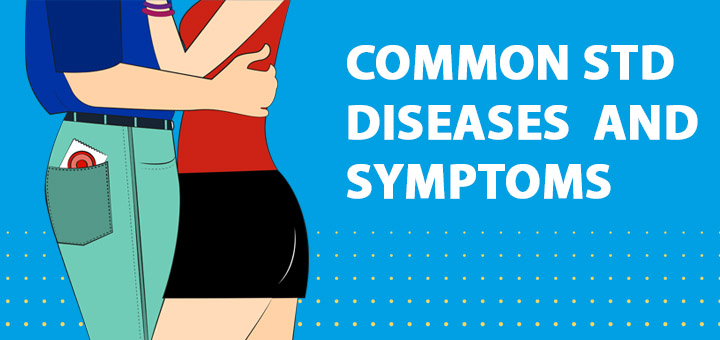Wondering what STDs are? Well, STDs are sexually transmitted diseases. Learning about STDs can help you protect your health. There is the possibility of both men and women getting sexually transmitted infections and diseases if they indulge in unprotected sex, as they are passed from person to person through sexual contact. Bacteria, parasites, yeast, and viruses cause STDs. There are around 20 types of STDs. Read the following descriptions of some of the most common STDs and symptoms to increase your knowledge about them, which can help protect your sexual health.
Genital Herpes:
Genital herpes is a common STD caused by herpes simplex virus or HSV. This is caused by having vaginal, anal or oral sex with an affected person. Affected people have outbreaks of lesions looking like blisters around skin membranes of their genitals, rectum or mouth. These lesions can break open and become painful sores that take a long time to heal. Your doctor can prescribe medicines that help prevent and shorten outbreaks and ease the pain, as there is no permanent cure.
Syphilis:
Syphilis infection is caused by bacteria during vaginal, anal or oral sex. The symptoms appear in the form of sores on the genitals, lips, and in the mouth and later a skin rash develops. The rash appears on the palms of the hands and soles of the feet sometimes. Symptoms appear 90 days after exposure to syphilis bacteria. The infection can last for weeks or even years. If untreated, syphilis can cause serious health problems such as brain damage, paralysis, blindness, and dementia.
Chlamydia:
Chlamydia is a bacterial infection that occurs in your genital tract. This disease occurs three weeks after exposure to the bacteria without any symptoms. Lower abdominal pain, discharge from the penis or vagina, and burning during urination are some signs of the disease. Chlamydia spreads through sexual contact with the penis, vagina, mouth or anus of an infected person. If untreated, Chlamydia can lead to serious health problems.
Human Papillomavirus (HPV):
HPV is one of the most common sexually-transmitted infections. Most sexually active persons will have HPV at some point. You can get this infection through vaginal, anal, or oral sex as well as skin contact. There are several types of HPV, most of them are harmless without any symptoms, and they heal on their own over a period of time. Some types of HPV are known to cause genital warts, mouth and throat infection.
Gonorrhea:
Gonorrhea is a bacterial infection that affects the genital tract. Gonorrhea spreads through sexual contact with the penis, vagina, mouth or anus of an infected person. The symptoms appear in about 10 days after exposure to the bacteria. Most people with gonorrhea have mild or no symptoms, but symptoms in some people are bloody discharge from the penis or vagina and painful sensation while urinating. Gonorrhea can also develop in the urethra, mouth, throat, eyes, and anus. Without treatment, gonorrhea can lead to serious health problems.
Trichomoniasis:
Trichomoniasis comes from anaerobic, flagellated protozoan parasite that passes from one person to another during sex. Most of the affected people don’t have symptoms. Some signs of the disease are itching or burning during urination, discharge from the penis or the vagina. These symptoms may come and go.
HIV/AIDS:
AIDS is caused by HIV or human immunodeficiency virus. HIV enters the body and attacks the immune system and destroys infection-fighting white blood cells. People with HIV infection develop serious diseases like pneumonia and tuberculosis. It spreads from person to person through blood or semen during vaginal and anal sex and sharing needles or syringes with an infected person. As there are no early symptoms, one needs to take a screening test for diagnosis. AIDS is not curable, but treatment is available to help affected people live longer and maintain an active life.
STD testing is important because of the fact that some STDs show symptoms and some don’t. After reading the above article, if you had unprotected sex and think you might have been infected with an STD, please consult your doctor right away and take a test.

